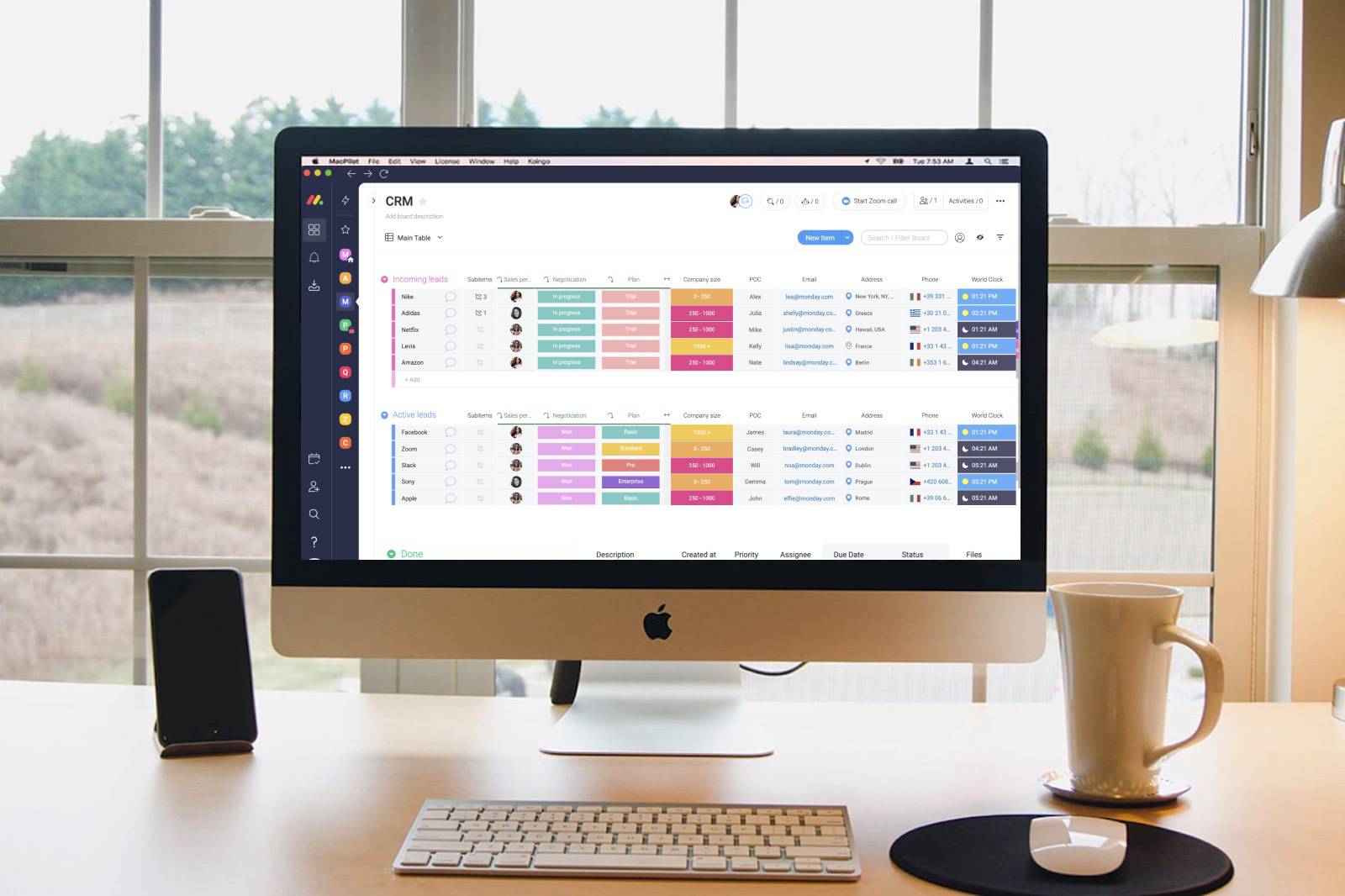There is no question; the world runs on data. So, how do we store, manage, and use all that data? A database program or app.
What is Database Software?
Organizations use various types of data for all aspects of business. Some examples include customer lists, employee records, vendor contact information and orders, inventory, etc. Companies use database software to organize, manage, and analyze data in different ways. A database can be something as simple a single spreadsheet or as complex as a large system with hundreds of tables, thousands of records, views, reports, and filters.
For example, a business may use CRM (customer relationship management) software or a straight database to track customers' buying habits, orders, preferences, and contact details. Then, using a database app, they can sort and filter this information for sales and marketing purposes.
How to Choose the Best Database App
Since every business is different, your needs may differ widely from another company's. However, some of the things to consider when choosing the best database app for your project include:
Ease-of-Use
Different people within your organization need to use the database to perform tasks, pull data, and analyze the information. Therefore, it must be easy enough to use for all levels of management and staff.
Flexibility
A good database app will be flexible. Since most of them cost money, you want to maximize your investment with something you can use for many different types of projects
Scalability
You don't want to start a big project and find out later when your business grows, that the database can't handle the new information. It's critical to find an app that is constantly improving and can grow right alongside your business as your needs change.
Support
Developing a business-reliant database can be daunting, so it's also essential that the app company offer different types of support so you can get the help you need to complete the project smoothly and efficiently.
The Best Database Apps for You
To take the guesswork out of choosing the best database app for your business, we have compiled a list of the best platforms to create your database applications.
1. QuickBase
A top contender among database apps is Quickbase which users give a rating of 4.5 out of 5 stars consistently. Quickbase is a "unified no-code platform," making it easy to create limitless workflows to support business operations.

Professionals hail Quickbase as one of the easiest platforms to use and one of the fastest. The interface uses wizards to stitch the pieces together quickly, and within minutes you can have a working database. Users love the quick form creation feature, and you don't have to be a programmer to create complex apps easily.
The weak spots are collaboration, and the user interface (UI) is outdated and could use some tweaking. The app is quite expensive, starting at $600/month for teams and increasing from there. The lowest plan allows you to create 50 database projects.
✅ PROS:
- Lightweight, fast app creation.
- Easy-to-use.
- No coding experience is needed.
- Easy to create forms.
- Web-based UI.
- Tons of integrations.
- Guided tutorials.
⛔️ CONS:
- UI needs updating.
- No mobile app support.
- Lacks polish in some areas.
- Missing collaboration tools.
- Expensive.
2. Airtable
One of our favorite database apps is Airtable. Not only is Airtable one of the easiest to use relational database apps, but it's also one of the most flexible. You can use it for just about anything.

The main interface will seem familiar to most users because it looks like a spreadsheet. However, you can also use a variety of other views such as Kanban, calendar, gallery, form, Gantt, timeline, and more. They have also just added a fantastic new feature where you can design your own interface so anything you can dream up can become the new view for your information.
One of its best features is the built-in collaboration tools custom-tailored for teams. All data syncs in real-time, and the program is lightweight and highly intuitive. The app has dozens of templates to help you get started on a project, and it's very affordable. They offer a free version which is packed with great features and may suffice for some users. Then their pricing starts at $10/user per month and goes up from there. Many noteworthy companies like Netflix, Medium, BuzzFeed, and Time use Airtable for their database projects.
✅ PROS:
- Extremely customizable.
- Flexible to handle any project.
- Collaboration tools built in.
- Integrations.
- Affordable.
- Well-maintained and documented.
- Free version available.
- Works on all platforms.
- Very modern, polished UI.
⛔️ CONS:
- Some users have issues with missing features or formatting.
- Need the paid version to access some of the best features, such as new views.
3. Caspio
Many companies are moving towards a no-code development platform for cloud apps. Caspio is one of those companies looking to cash in on the trend. They offer a no/low-code solution for businesses to create shared databases apps in the cloud.

Users love the easy interface and say that although it appears simple, there is a lot of power under the hood. It can handle simple customer databases and complex manufacturing workflows effortlessly.
However, if you want to take things further, you may need a developer to use those hidden programming features. Some companies find it hard to locate programmers who specialize in Caspio. The company offers a limited free plan, then pricing starts at $100/month and goes up to $400/month. They also offer enterprise pricing if needed.
✅ PROS:
- Easy to use for simple projects.
- High-quality results.
- Full featured for any project.
⛔️ CONS:
- Pricey.
- Lackluster support.
- May need a programmer for complex reports or functionality.
- Steep learning curve for beginners.
4. Knack
Knack is another up-and-comer gaining traction in the database world. Knack is another no-code option for businesses looking to organize their information and create collaborative solutions for the entire team. For teams with a lot of users, Knack's pricing model is sure to please.

You can make simple to very complex database solutions easily with Knack without knowing a single line of code. In addition, their pricing is very affordable, starting at $39/month to $179/month for large companies. The best part is there are no user limits, so even with the lowest tier, you can have as many users engaged without breaking the bank.
✅ PROS:
- Easily build custom applications with no coding.
- No user limits.
- Helpful support tutorials.
- Can easily handle very complex database solutions.
- Great features like automation, payments, dashboards, reports, and plenty of integrations.
⛔️ CONS:
- Internal IDs/foreign keys are hidden.
- Slow to add new features.
- Rigid workflow.
- Hard to use for some beginners.
- Errors with large data sets.
- Lacking in some features.
5. Trello
Trello is project management software and a powerful/flexible database that businesses can use to create custom applications to keep all team members on the same page. The interface is very modern, very user-friendly, and highly customizable. Many users won't even scratch the surface of all Trello has to offer.

Trello uses a Kanban view to keep track of all different types of information like projects, users, due dates, tasks, and more. The service is web-based and supports all platforms, including mobile. Trello is great for tracking work progress, users, and other time-sensitive business operations. They offer a free version, but it is limited. The paid tiers are affordable, starting at $5/per user per month.
✅ PROS:
- Great, intuitive interface.
- Flexible and customizable for various team-oriented projects.
- Great for workflows.
⛔️ CONS:
- May require add-ons to get all the features you need.
- May not work for all types of databases projects.
6. Monday
For companies looking to create a complex customer tracking system, project management workflow, or other database solution, you can't go wrong with Monday.com

Monday is a highly respected online service that pieces together spreadsheet-type data into a modern, attractive view for the whole team. Although some people think Monday.com is a project management app, it's truly more of a database solution.
Monday.com was built for teams and includes dozens of collaboration features. It also works on all platforms, including mobile. Monday.com is ideal for teams that want to view data in different ways. They offer a bunch of different customizable views and many project templates to get you started. They do offer a free version, but it doesn't come with all the bells and whistles. Pricing starts at $8/per user per month and goes up from there.
✅ PROS:
- Very customizable.
- Sleek-looking UI.
- Powerful features.
- Automations.
- Solution templates.
- Views: timeline, Gantt, calendar, Kanban.
- Guest access.
- Affordable.
⛔️ CONS:
- Free version is limited.
- Steep learning curve.
What is the Best Database App?
The best database app for your business will depend highly on your needs, expectations, and budget. Each of these options offers you a no/low-code experience to quickly create robust team-based solutions.
If you need more views, you might consider Airtable or Monday.com. If you require a complex solution with automation, formulas, and other high-end features, you might consider Knack or Caspio.

